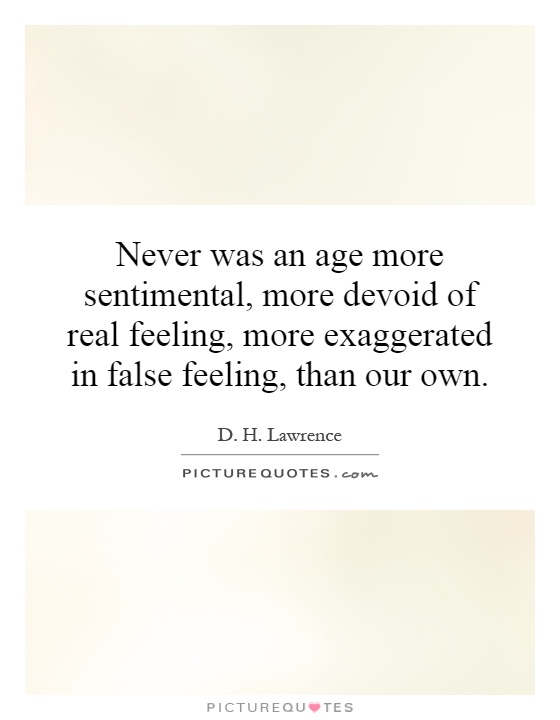Never was an age more sentimental, more devoid of real feeling, more exaggerated in false feeling, than our own

Never was an age more sentimental, more devoid of real feeling, more exaggerated in false feeling, than our own
D.H. Lawrence, a renowned writer of the early 20th century, was known for his criticism of modern society and its lack of genuine emotion. In his works, Lawrence often explored the theme of emotional authenticity and the impact of industrialization on human relationships. The quote, "Never was an age more sentimental, more devoid of real feeling, more exaggerated in false feeling, than our own," perfectly encapsulates Lawrence's views on the state of emotions in his time.Lawrence believed that the rapid industrialization and technological advancements of the early 20th century had led to a disconnect between individuals and their emotions. The rise of consumerism and materialism had created a society focused on superficial appearances and shallow relationships, devoid of true emotional depth. In his novel "Sons and Lovers," Lawrence explores the impact of industrialization on the lives of the characters, highlighting the struggle to maintain authentic emotional connections in a world driven by material pursuits.
Furthermore, Lawrence criticized the sentimentality and false emotions that he believed were prevalent in his time. He argued that people had become overly sentimental, relying on clichés and empty gestures to express their feelings, rather than engaging in genuine emotional experiences. In his essay "Love and Hate," Lawrence discusses the superficiality of modern relationships, stating that "we are sentimental, we are emotional, we are full of false feeling, but we are not in love."
Lawrence's critique of modern society's lack of real feeling and exaggerated false emotions is still relevant today. In an age dominated by social media and virtual connections, the pressure to present a curated version of oneself often leads to a distortion of true emotions. The constant need for validation and approval through likes and comments can hinder genuine emotional expression and create a culture of superficiality.












 Friendship Quotes
Friendship Quotes Love Quotes
Love Quotes Life Quotes
Life Quotes Funny Quotes
Funny Quotes Motivational Quotes
Motivational Quotes Inspirational Quotes
Inspirational Quotes